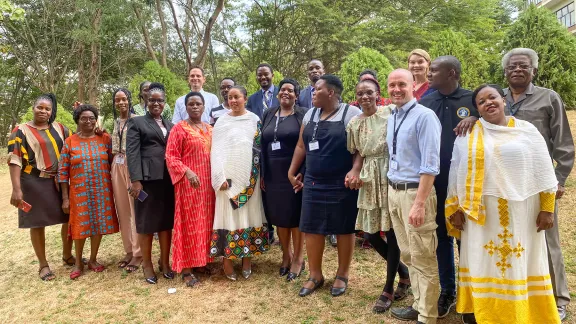Students from Ethiopia, Namibia, South Africa, Tanzania and Zimbabwe graduate from program on theology, gender justice and leadership education established to honor the legacy of Malagasy theologian Hélène Ralivao.

The first cohort of graduates from the Tumaini University Makumira program on theology, gender justice and leadership education, together with LWF program executives Rev. Dr Chad Rimmer and Rev. Katarina Kiilunen. Photo: Makumira University
Students at Tumaini University Makumira say they hope to bring positive change to church and society in Africa
(LWI) - The first graduates from a new Lutheran World Federation (LWF) gender justice training program hope to build on their research in order “to bring positive changes” in their churches across the African continent.
Students from Ethiopia, Namibia, South Africa, Tanzania and Zimbabwe took part in a graduation ceremony on 7 and 8 February at the Tumaini University Makumira in Arusha, Tanzania. The women and men made up the first cohort of students enrolled in the Theology, Gender Justice and Leadership Education program set up by the university in partnership with the LWF and the local Evangelical Lutheran Church in Tanzania (ELCT).
The program was established as part of the Hélène Ralivao Fund to honor the legacy of one of Madagascar’s first female theologians and women’s rights campaigners in the Malagasy Lutheran Church who was murdered in 2020. The course includes two residential training sessions and an individual research project in which students explore issues of gender equality relevant to their own church and national contexts.
Individual and institutional transformation
Amongst the topics that this first cohort of students have been researching were preventing and responding to gender-based violence, investing in child development to foster gender equality and promoting women’s participation in church leadership. Rev. Patricia Jabedu from the Evangelical Lutheran Church in Zimbabwe said her research showed that “single women are not acceptable in church leadership.”. She said: “The church should be taught through Bible studies and other platforms that to be single is not a sin” and women “should be equipped to take leadership positions.” Church leaders must be encouraged to “take appropriate action when cases of gender-based violence are reported to them,” she added.
Speaking at the graduation ceremony, Rev. Dr Chad Rimmer, LWF Program Executive for Lutheran Theology and Practice said the course aims to promote change and empowerment at individual level, as well as working towards institutional change and social transformation. Praising the students for the “depth of passion, deep knowing and yearning for truth, justice and transformation that motivated you, sometimes in very difficult situations,” he added: “We have seen your confidence and capacities, as leaders in your fields of ministry, grow in the course of this year.”
The purpose of our research findings was for us to learn and to bring about positive changes in our own contexts.
– Rev. Gwakisa Mwaipopo, Evangelical Lutheran Church in Tanzania
Rev. Gwakisa Mwaipopo, a student from the ELCT, said he was happy to hear that the LWF has recommended the publication of the research papers to serve as a resource for other churches and institutions in Africa and beyond. “Our research findings were not designed for our supervisors to give us grades, but their purpose was for us to learn and to bring about positive changes in our own contexts,” he said.
LWF Program Executive for Leadership and Capacity Development Rev. Katariina Kiilunen noted that gender injustice and exclusion, as well as domestic and gender-based violence are rooted in a variety of social and theological factors. “From the perspective of the global communion of churches,” she said, “we stand in solidarity with women and gender minorities around the world who face challenges that restrict access to theological education, leadership roles and decision-making processes in our society, our churches and our theological institutions.”


